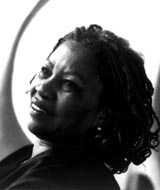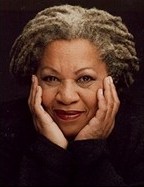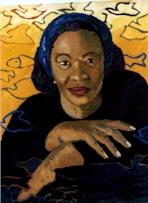Toni Morrison

The Life of
Toni Morrison
Toni Morrison was
born Chloe Anthony Wofford in Lorain, Ohio after her parents moved to the
North to escape the problems of southern racism. On both sides of her family
were migrants and sharecroppers. She spent her childhood in the Midwest and
read avidly, from Jane Austen to Tolstoy. Morrison's father, George, was a
welder, and told her folktales of the black community, transferring his African-American
heritage to her generation. In 1949 she entered Howard University in Washington,
D.C. one of America's most distinguished black college. Morrison continued
her studies at Cornell University in Ithaca, New York where she received her
M.A. in 1955.
During 1955-57 Morrison was an instructor in English at Texas Southern University,
at Houston, and taught in the English department at Howard. She married Harold
Morrison, a Jamaican architect, in 1958. Together they had two children, Harold
Ford and Slade Kevin. After 6 years of marriage she divorced Harold in 1964.
While working and caring for her children, Morrison wrote her first novel,
The Bluest Eyes, which appeared in 1970. She continued to write novels and
later Morrison was appointed the position Robert F. Goheen Professor of the
Council of the Humanities at Princeton University in the spring of 1989, becoming
the first black woman ever to hold a chair at an Ivy League school. Morrison
now continues to teach fiction and live in Princeton, New Jersey.
Awards and
Novels
 In
1970 Morrison’s literary career began when The Bluest Eye was
published. Set in Morrison’s hometown, the novel received critical acclaim
but failed to attract the public’s interest. Sula, Morrison’s
second novel, was published in 1973, and because of her insightful portrayal
of the African-American lifestyle; Sula was nominated for National
Book Award and received the Ohioana Book Award. Her next novel, Song of
Solomon(1977), was a paper back best seller. Its homage to the richness
of the black cultural heritage helped Morrison win two more awards: National
Book Critics Circle Award and American Academy and Institute of Arts and Letters
Award. Later, in 1987 Morrison published Beloved. The novel illustrated
the horrifying lives of slaves and how one ex-slave’s past haunts her.
The novel received international success and was honored with the Pulitzer
Prize. Beloved also won other awards including New York State Governor's
Arts Award, First recipient of the Washington College Literary award, National
Book Award nomination and National Book Critics Circle Award nomination.
In
1970 Morrison’s literary career began when The Bluest Eye was
published. Set in Morrison’s hometown, the novel received critical acclaim
but failed to attract the public’s interest. Sula, Morrison’s
second novel, was published in 1973, and because of her insightful portrayal
of the African-American lifestyle; Sula was nominated for National
Book Award and received the Ohioana Book Award. Her next novel, Song of
Solomon(1977), was a paper back best seller. Its homage to the richness
of the black cultural heritage helped Morrison win two more awards: National
Book Critics Circle Award and American Academy and Institute of Arts and Letters
Award. Later, in 1987 Morrison published Beloved. The novel illustrated
the horrifying lives of slaves and how one ex-slave’s past haunts her.
The novel received international success and was honored with the Pulitzer
Prize. Beloved also won other awards including New York State Governor's
Arts Award, First recipient of the Washington College Literary award, National
Book Award nomination and National Book Critics Circle Award nomination.
In 1993, Morrison
won the Nobel Prize for Literature as an author "who in novels characterized
by visionary force and poetic import, gives life to an essential aspect of
American reality". She became the eighth woman and the first African-American
to win the prize. After hearing the news from a colleague at Princeton University
she was happy and honored by her achievement. She further explained, “What
is most wonderful for me, personally, is to know that the Prize at last has
been awarded to an African-American. Winning as an American is very special-but
winning as a Black American is a knockout.” After receiving the highest
honor in literature, Morrison continued her success and reentered the best
sellers list with the publication of Paradise and later wrote with
her son The Big Box.
Morrison's
Writing Style
 Morrison's
writings concentrate on rural Afro-American communities and on their cultural
inheritance, which she explores with cold-blooded detail and vivid vocabulary.
Her intricate writing style does not just tell the reader about issues concerning
African-Americans instead she shows them. In Beloved, set in Ohio
and a plantation in Kentucky, Morrison shows slavery through flashbacks and
stories told by characters. Her word choices give the reader the sense on
how slave masters viewed their slaves as savage animals. Her work is described
as breath taking, leaving Beloved more then a story; it is a history,
and it is a life of its own.
Morrison's
writings concentrate on rural Afro-American communities and on their cultural
inheritance, which she explores with cold-blooded detail and vivid vocabulary.
Her intricate writing style does not just tell the reader about issues concerning
African-Americans instead she shows them. In Beloved, set in Ohio
and a plantation in Kentucky, Morrison shows slavery through flashbacks and
stories told by characters. Her word choices give the reader the sense on
how slave masters viewed their slaves as savage animals. Her work is described
as breath taking, leaving Beloved more then a story; it is a history,
and it is a life of its own.
Also growing up in Ohio gives Morrison a distinction as writer. Morrison places the setting in some of her novels there. Morrison explained “I am from the Midwest so I have a special affection for it. My beginnings are always there (Ohio) ... No matter what I write, I begin there ... Ohio also offers an escape from stereotyped black settings. It is neither plantation nor ghetto."
“Vivid dialogue, capturing the drama and extravagance of black speech, gives way to an impressionistic evocation of physical pain or an ironic, essay-like analysis of the varieties of religious hypocrisy" -- Margo Jefferson (Newsweek).
“Toni Morrison is an important novelist who continues to develop her talent. Part of her appeal, of course, lies in her extraordinary ability to create beautiful language and striking characters. However, Morrison's most important gift, the one which gives her a major author's universality, is the insight with which she writes of problems all humans face.... At the core of all her novels is a penetrating view of the unyielding, heartbreaking dilemmas which torment people of all races" -- Elizabeth B. House (Dictionary of Literary Biography Yearbook).
“(Morrison)
works her magic charm above all with a love of language. Her ... style carries
you like a river, sweeping doubt and disbelief away, and it is only gradually
that one realizes her deadly serious intent" -- Susan Lydon (Village
Voice).
Morrison and
Race
 Through
out Morrison’s novel she does not use whites for main characters. Often
she is criticize for this. She explains her choice of characters by“
I look very hard for black fiction because I want to participate in developing
a canon of black work. We've had the first rush of black entertainment, where
blacks were writing for whites, and whites were encouraging this kind of self-flagellation.
Now we can get down to the craft of writing, where black people are talking
to black people." Furthermore, she stated “the Black narrative
has always been understood to be a confrontation with some White people. I’m
sure there are many of them. They’re not terribly interesting to me.
What is interesting to me is what is going on within the community. And within
the community, there are no major White players. Once I thought, ‘What
is life like if they weren’t there?’ Which is they way I- we lived
it, the way I lived it.”
Through
out Morrison’s novel she does not use whites for main characters. Often
she is criticize for this. She explains her choice of characters by“
I look very hard for black fiction because I want to participate in developing
a canon of black work. We've had the first rush of black entertainment, where
blacks were writing for whites, and whites were encouraging this kind of self-flagellation.
Now we can get down to the craft of writing, where black people are talking
to black people." Furthermore, she stated “the Black narrative
has always been understood to be a confrontation with some White people. I’m
sure there are many of them. They’re not terribly interesting to me.
What is interesting to me is what is going on within the community. And within
the community, there are no major White players. Once I thought, ‘What
is life like if they weren’t there?’ Which is they way I- we lived
it, the way I lived it.”
Morrison’s upbringing has additionally contributed to her character choice, themes in her novel and how she views white people. Her father was the main contributor towards her outlook on whites. Morrison has described her father’s racist attitude towards whites and events in her childhood in interviews. When she was two years old her family’s home was set on fire while they were in it. “People set our house on fire to evict us…” said Morrison. Her father became even more upset with whites after the incident. “He simply felt that he was better and superior to all white people” explained Morrison. When she was asked if she felt the same way that her father felt she responded “No, I don’t feel quite the same way as he did. With very few exceptions, I feel that White people will betray me: that in the final analysis, they’ll give me up.”
More Toni Morrison
Additional resources about Toni Morrison, including a complete list of works, speeches, and conversations can be found here.